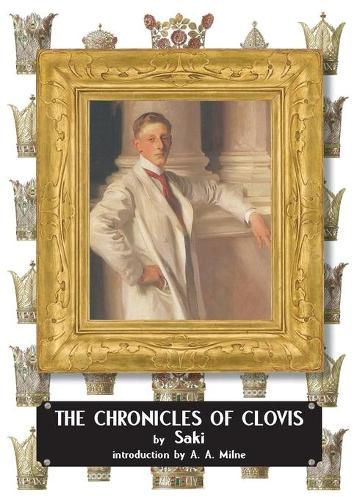Readings Newsletter
Become a Readings Member to make your shopping experience even easier.
Sign in or sign up for free!
You’re not far away from qualifying for FREE standard shipping within Australia
You’ve qualified for FREE standard shipping within Australia
The cart is loading…






This title is printed to order. This book may have been self-published. If so, we cannot guarantee the quality of the content. In the main most books will have gone through the editing process however some may not. We therefore suggest that you be aware of this before ordering this book. If in doubt check either the author or publisher’s details as we are unable to accept any returns unless they are faulty. Please contact us if you have any questions.
In two brilliant collections of stories, Reginald (1904) and Reginald in Russia (1910), which spanned the Edwardian period, Saki made his name as the predominant wit of the emergent twentieth century. As the new Georgian age dawned, his star was at its height:
..Sylvia, notwithstanding her name, was accustomed to nothing much more sylvan than leafy Kensington. She looked on the country as something excellent and wholesome in its way, which was apt to become troublesome if you encouraged it overmuch…
…I love Americans, but not when they try to talk French. What a blessing it is that they never try to talk English…
…You needn’t tell me that a man who doesn’t love oysters and asparagus and good wines has got a soul, or a stomach either. He’s simply got the instinct for being unhappy highly developed.
In this volume, first published in 1911, he introduced a new titular character, albeit with a huge resemblance to both Reginald and himself. Clovis Sangrail is unsurprisable, louche in conversation, thoroughly determined to avoid the banal. In this magnificent collection, he observes the ludicrous with an unswerving eye, and undermines it with rapier-like skill, while gleefully and covertly turning all to his advantage. Saki had announced himself as the brief Edwardian flame burnt itself out; with the brilliance of this volume he made it plain that he had no intention of fading away.
$9.00 standard shipping within Australia
FREE standard shipping within Australia for orders over $100.00
Express & International shipping calculated at checkout
This title is printed to order. This book may have been self-published. If so, we cannot guarantee the quality of the content. In the main most books will have gone through the editing process however some may not. We therefore suggest that you be aware of this before ordering this book. If in doubt check either the author or publisher’s details as we are unable to accept any returns unless they are faulty. Please contact us if you have any questions.
In two brilliant collections of stories, Reginald (1904) and Reginald in Russia (1910), which spanned the Edwardian period, Saki made his name as the predominant wit of the emergent twentieth century. As the new Georgian age dawned, his star was at its height:
..Sylvia, notwithstanding her name, was accustomed to nothing much more sylvan than leafy Kensington. She looked on the country as something excellent and wholesome in its way, which was apt to become troublesome if you encouraged it overmuch…
…I love Americans, but not when they try to talk French. What a blessing it is that they never try to talk English…
…You needn’t tell me that a man who doesn’t love oysters and asparagus and good wines has got a soul, or a stomach either. He’s simply got the instinct for being unhappy highly developed.
In this volume, first published in 1911, he introduced a new titular character, albeit with a huge resemblance to both Reginald and himself. Clovis Sangrail is unsurprisable, louche in conversation, thoroughly determined to avoid the banal. In this magnificent collection, he observes the ludicrous with an unswerving eye, and undermines it with rapier-like skill, while gleefully and covertly turning all to his advantage. Saki had announced himself as the brief Edwardian flame burnt itself out; with the brilliance of this volume he made it plain that he had no intention of fading away.